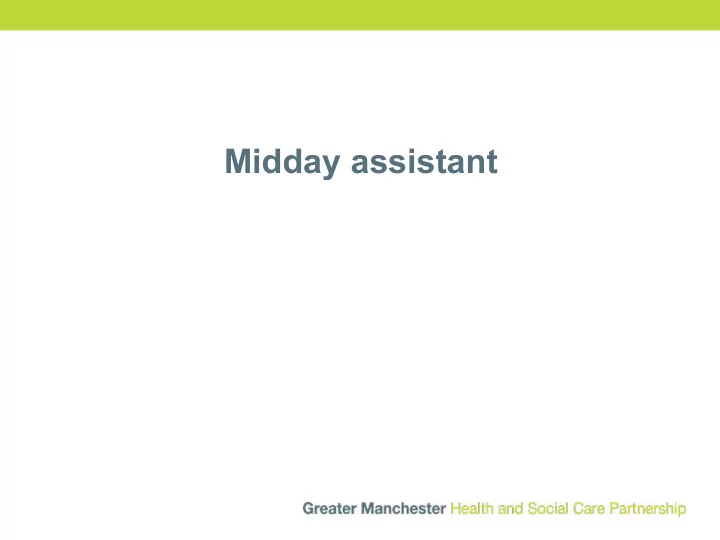

Midday assistant
Learning Objectives • Understanding ADHD and effective on those with a diagnosis. • Develop strategies you can use when working with children in unstructured times in the day.
What is ADHD? • ADHD stands for Attention Deficit Hyperactivity Disorder which is a recognised medical condition with specific symptoms. 1 • ADHD is a behavioural disorder where the brain develops and works in a different way from those not affected. 2
What causes ADHD? Genetic Brain Environment development A combination of factors
Key symptoms Impulsivity Inattention Hyperactivity These symptoms occur in every child from time to time but when they are persistent and impact on daily functions, further investigation is needed. American Psychiatric Association. Diagnostic and Statistical Manual of Psychiatric Disorders DSM-IV-TR (2009)
What is ADHD? Select most appropriate videos ADHD - Challenges with accessing services https://www.dropbox.com/s/j8po75lbex3xiiv/ADHD%20- %20Challenges%20with%20accessing%20services.mov?dl=0 What is ADHD? https://www.dropbox.com/s/yqtk5wsl5ua94v5/What%20is%20ADHD.mov?dl=0 ADHD - Challenges in education https://www.dropbox.com/s/9psnn4smrq6tm9v/ADHD%20- %20Challenges%20in%20education.mov?dl=0 ADHD - Challenges with life skills https://www.dropbox.com/s/vycm86kc75blbzi/ADHD%20- %20Challenges%20with%20life%20skills.mov?dl=0 ADHD - Challenges with peers https://www.dropbox.com/s/y9ejy3ea1pioct6/ADHD%20- %20Challenges%20with%20peers%20.mov?dl=0
Famous people with ADHD Sir Richard Branson Chef Jamie Oliver Michael Phelps Ensure research has been completed and all people listed have ADHD before adding to this list
Positives about ADHD Many people with ADHD have: • Lots of energy • Creative and imaginative • Increased ability to multi task • Adaptable • Humour • Problem solving by thinking outside the box
How many children are affected? • ADHD is the most common behavioural disorder in the UK. 1 • It is estimated that ADHD affects around 2-5% of school-aged children and young people. 1 • In UK, it is believed that the prevalence of severe ADHD in the school-age population is 1.5%, and the less severe form is 3-5%. 2
Insert in case study to be discussed • eg. queue cutting at lunch
What went well/ did not work well? Would you have done any thing differently? What do you think will happen tomorrow?
Some useful websites* www.addiss.co.uk www.help4adhd.org www.nice.org.uk www.mentalhealth.com www.sign.ac.uk www.adhdtogether.com www.handsonscotland.co.uk www.addup.co.uk www.netdoctor.co.uk www.ukadhd.com Your Local Offer
Thank you to all our partners & All members of the SCN ADHD Training Workstream
Recommend
More recommend